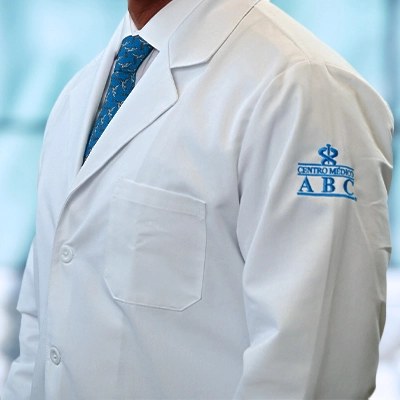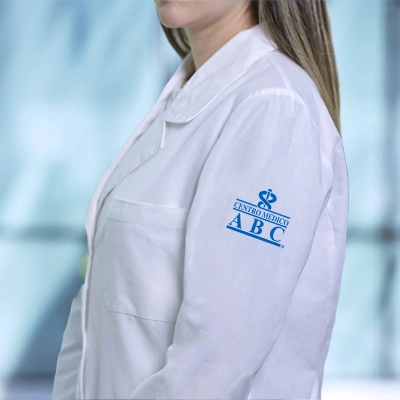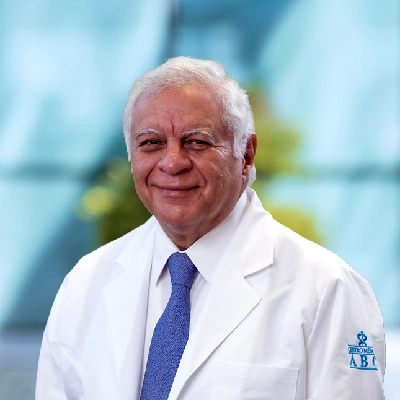Contact us
Precision Medicine
Find your doctor
View 1651 Doctors
There are no doctors that match the search
Have been found doctors


Juvenal Franco Granillo
Specialty: Critical Care Medicine | Internal Medicine
Medical License: 1003875
Management: Sur 136 No. 116, Col. Las Américas, Álvaro Obregón, 1120. Campus Observatorio, Edificio: Torre Donald Mackenzie, Piso 4, Consultorio: 408 55 5272-0200

Marco Antonio Chávez Ramírez
Specialty: Anesthesiology
Medical License: 535033
Management: Av. Carlos Graef Fernández 154, Col. Santa Fe, Cuajimalpa, 5300. Campus Santa Fe, Edificio: Torre Central, 2, Consultorio: 212-214

César Óscar Decanini Terán
Specialty: Digestive System Surgery | General Surgery | Coloproctology
Medical License: 270853
Management: Av. Carlos Graef Fernández 154, Col. Santa Fe, Cuajimalpa, 5300. Campus Santa Fe, Edificio: Torre Central, Piso 3, Consultorio: 310-313 55 5272-3327

Enrique Pablo Vallejo Venegas
Specialty: Clinical Cardiology | Nuclear Cardiology Medicine
Medical License: 1769107
Management: Sur 136 No. 116, Col. Las Américas, Álvaro Obregón, 1120. Campus Observatorio, Edificio: Torre Sur, Piso 4, Consultorio: 2-B y 2-C 55 5135-2984 Ext. 4022

Alexandra Bermúdez Rodríguez
Specialty: Biology of Human Reproduction | Gynecology and Obstetrics
Medical License: 2135252
Management: Av. Carlos Graef Fernández 154, Col. Santa Fe, Cuajimalpa, 5300. Campus Santa Fe, Edificio: CEGOP, Piso 3, Consultorio: 333 55 1664-7235

Francisco Moreno Sánchez
Specialty: Infectious Disease | Internal Medicine
Medical License: 1429001
Management: Sur 136 No. 116, Col. Las Américas, Álvaro Obregón, 1120. Campus Observatorio, Edificio: Torre Central, Piso 2, Consultorio: 9 55 5273-1138 Ext. 3

Roberto Alfonso De Leo Vargas
Specialty: Neurosurgery
Medical License: 446460
Management: Av. Carlos Graef Fernández 154, Col. Santa Fe, Cuajimalpa, 5300. Campus Santa Fe, Edificio: CENOR, Piso 1, Consultorio: 155 55 1664-7205 Ext. 4155

Raquel Gerson Cwilich
Specialty: Medical Oncology
Medical License: 170449
Management: Sur 136 No. 116, Col. Las Américas, Álvaro Obregón, 1120. Campus Observatorio, Edificio: Centro de Cáncer, Piso 2, Consultorio: 201 55 5272-2521

Sergio Abush Torton
Specialty: Orthopedics and Traumatology
Medical License: 242975
Management: Av. Carlos Graef Fernández 154, Col. Santa Fe, Cuajimalpa, 5300. Campus Santa Fe, Edificio: Torre Central, Piso 1, Consultorio: 104-105 55 5596-6155
Medical directory: find your specialist
El Centro Médico ABC somos una institución que cuenta con más de 130 años de experiencia, buscando mejorar la salud en México. Brindamos, de esta forma, un servicio seguro y de calidad, orientado al paciente. Con un amplio directorio médico compuesto por profesionales capacitados en ofrecer el mejor servicio médico y hospitalario que tú y tu familia necesitan; los cuales están al nivel de los mejores en el mundo.
A través de este directorio médico, podrás encontrar una amplia variedad de especialistas que laboran en el Centro Médico ABC, teniendo la seguridad de que cada uno de ellos pasa por un riguroso proceso de selección y validación para poder operar en ambos Campus; ofreciendo así seguridad y conocimiento a cada paciente.
Para su uso, la herramienta “Encuentra a tu médico” te permitirá realizar búsqueda a partir del departamento, especialidad, padecimiento o procedimiento, logrando encontrar a todos aquellos médicos que pueden atender tus necesidades.
Además, y en caso de ya conocer el nombre del médico, se pueden encontrar sus datos de contacto a través del nombre o apellido. Navega mediante nuestro directorio y encuentra al profesional indicado para ti entre más de 1,500 médicos registrados.
Somos el único hospital en México que cuenta con Prácticas Médicas Grupales, el Centro Médico ABC reúne a especialistas de diversas disciplinas, quienes trabajan en conjunto y de manera multidisciplinaria para ligar un diagnóstico más preciso, poder determinar el mejor tratamiento y dar el seguimiento adecuado a cada uno de sus pacientes.
En los Centros de Alta Especialidad, encontrará personal médico especializado, que brinda un servicio seguro y de calidad, caracterizado por una orientación al paciente. Todo esto avalado por la Joint Commission International (JCI) y el Consejo de Salubridad General (CSG), que garantizan nuestro estatus como una Institución de Salud apegada a los más altos estándares de calidad y seguridad del mundo en ambos Campus: Observatorio y Santa Fe.

